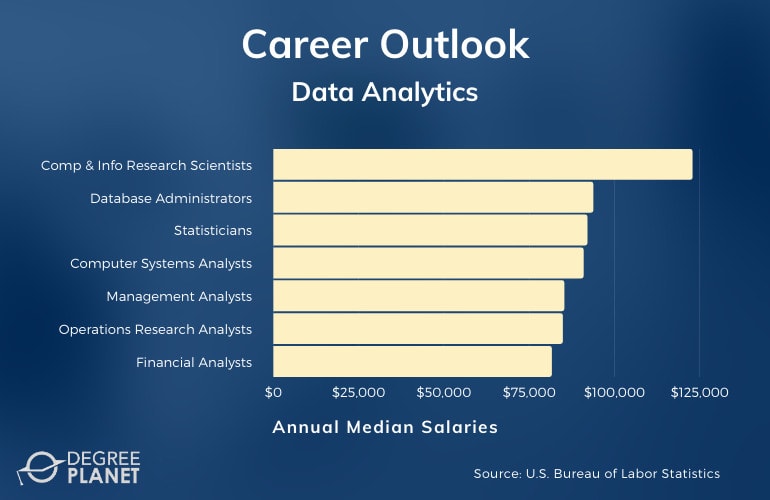Is a Masters in Data Analytics worth it? Going back to school can be a big commitment in terms of time and money. But this advanced level degree can help open the door to exciting careers using data to improve a company’s efficiency and profitability.

Editorial Listing ShortCode:
You could pursue work in nearly any industry and potentially earn a top salary in one of the fastest growing fields in the country.
Is a Masters in Data Analytics Worth It?

Yes, a Masters in Data Analytics is worth it for many students. The Bureau of Labor Statistics is projecting 11% job growth in computer and information technology occupations over the next 10 years.
Common data analytics careers in this field include operations research analyst, statistician, computer systems analyst, management analyst, financial analyst, budget analyst, cost estimator, and market research analyst.
Nearly all occupations in this field are predicted to experience tremendous growth over the next decade. For example, the Bureau of Labor Statistics estimates that computer and information research scientists will see 15% job growth, while operations research analysts will see a 25% growth.
Editorial Listing ShortCode:
In addition to positive growth, most professionals in data analytics also report high rates of job satisfaction (Business Insider), indicating that the work is stimulating, and they are able to see a measurable impact.
Having a graduate level degree in data analytics can help you set yourself apart from other job applicants.
If you already hold a bachelor’s in data analytics or a related stem field (with a number of statistics and computer science courses), you may be able to secure an entry level position, such as junior data analyst. But you will likely need either a graduate certificate in data analytics online or a master’s in data analytics (or related degree) in order to work in the most advanced and highest paid positions.
How to Decide Whether a Masters in Data Analytics is Right for You

If you enjoy math and statistics, or examining data to support arguments, data analytics may seem like a natural fit.
But there are other important traits you that can help you be successful in this field.
1. You have strong critical thinking and problem-solving skills.
A career in data analytics will likely require you to solve many puzzles – identifying and assessing a problem, determining what data you need and how to best collect it, identifying inconsistencies and errors in data, analyzing and drawing conclusions, and developing solutions.
The entire process requires critical thinking and problem solving skills.
2. You communicate accurately and efficiently.

A data analyst’s job doesn’t end once the data is analyzed; the findings must be presented to the decision makers.
Whether you are presenting your findings in a small board room with top executives or in front of a large audience, it’s important that you explain it in terms everyone can understand, avoiding jargon and unnecessary details.
You will need to break things down so that everyone can benefit from the work you have done.
3. You are comfortable working with technology.
Computer programming is a large part of data analytics. It’s very important that you are comfortable with coding in languages such as Python, database management, Big Data processing and machine learning.
And because technology is always changing, you should be open to learning new languages and adapting to new software programs to improve your efficiency.
You work well independently and with others.

A fair amount of your work collecting, analyzing, and visualizing data will probably be done independently. You may spend many hours working alone at your desk.
However, you may also work closely with members of the IT, marketing, sales and upper management teams, for example. The ability to collaborate with people who think differently will be important.
5 Things You Can Do with a Master’s in Data Analytics Degree
With a Masters in Data Analytics you will likely enter a career in which you are gathering and analyzing data in order to improve the efficiency of a business.
Editorial Listing ShortCode:
However, this type of work is needed in a variety of industries – healthcare, education, finance, government – and the roles may vary in each.
Here are five of the top career paths in this field:
1. Operations Research Analyst

Operations research analysts identify and solve problems in order to help businesses operate more efficiently.
They may be examining resource allocation, production schedules, supply chain or pricing, for example. Using techniques like data mining, statistical analysis, simulation and predictive modeling, they analyze the data and develop solutions.
This type of efficiency is valuable in all industries, from finance and insurance, to manufacturing to governmental agencies, and more.
2. Market Research Analyst

Market research analysts help companies understand how to effectively market their products or services.
They collect data about consumers’ preferences and buying habits by conducting focus groups, polls or interviews. They also research competitor’s products, sales and marketing strategies. This data is then evaluated using statistical software as well as charts, graphs and visual aids.
The market research analyst then presents their findings to the client so that they can make more informed decisions about their products and marketing plans. A master’s in data analytics or even a master’s in business analytics is worth it for many seeking this occupation.
3. Statistician

Statisticians gather, interpret and present data that can support or improve business decisions.
They collect data through surveys, experiments or polls, and then use statistical software to analyze it. They consider the limitations or potential errors that could result in inaccurate conclusions, and then they present their findings.
Statisticians may work in education, marketing, healthcare, psychology, sports, government – nearly any field.
4. Management Analyst

Management analysts advise managers on how to reduce costs and maximize profit and productivity.
They may interview managers and employees, observe processes, or collect data in order to get a sense of how the company runs and what changes should be implemented. Management Analysts are most often consultants, and may specialize in a specific industry, such as healthcare or telecommunications.
5. Computer and Information Research Scientist

Computer and information research scientists work to invent and/or improve computer hardware and software.
They work with complex algorithms to design new computer architecture that improves performance and can lead to better networking, faster computing, and improved security, among other things. Individuals in this field may specialize in areas such as robotics or programming.
Master’s in Data Analytics Degree Alternatives
As you explore Data Analytics degree programs, you may find that there are some very closely related degree programs.
Editorial Listing ShortCode:
You may also want to consider the following alternatives:
- Master’s in Data Science. Data analytics and data science are remarkably similar. Data science is slightly more focused on taking data a step further by using machine learning models to develop custom algorithms that help make predictions. But because of the increased overlap between the two areas of study, many colleges have combined them into one program.
- Master’s in Business Analytics. As compared to a degree in data analytics, this degree path focuses on using data to drive business decisions and improve efficiency. The program will likely include fewer math courses, with more of an emphasis on business principles.
- Master’s in Statistics. A Statistics degree is usually extremely math heavy. It can help you learn how to collect, organize, analyze, and interpret data.
Knowing your career goals – and even which industry you hope to work in – can help you determine which degree program is right for you.
Data Analytics Careers & Salaries

It’s no secret that data analytics is a lucrative field, but just how much you can earn depends on your specific title, the industry and your location.
Here are some examples of careers you could consider, and their respective salaries according to data from the Bureau of Labor Statistics:
| Careers | Annual Median Salaries |
| Computer and Information Research Scientists | $126,830 |
| Database Administrators | $98,860 |
| Computer Systems Analysts | $93,730 |
| Statisticians | $92,270 |
| Management Analysts | $87,660 |
| Operations Research Analysts | $86,200 |
| Financial Analysts | $83,660 |
| Budget Analysts | $78,970 |
| Cost Estimators | $66,610 |
| Market Research Analysts | $65,810 |
As you can see, there are many different careers in analytics, and they all have the potential to provide very impressive salaries.
Getting Your Data Analytics Degree Online

Whether you’re trying to advance in your current career or transition into this growing field, pursing a masters in data analytics may be the right choice. Many well-respected, accredited schools now offer flexible online programs so that you can get ahead without putting your life on hold.
An accelerated program can help you finish in as little as 12 months, or you can take just a few courses at a time to fit your coursework in around your family, work, and other commitments.
No matter what type of program you choose, a masters in data analytics can help prepare you for an exciting career in one of the highest paying, fastest-growing fields out there.

